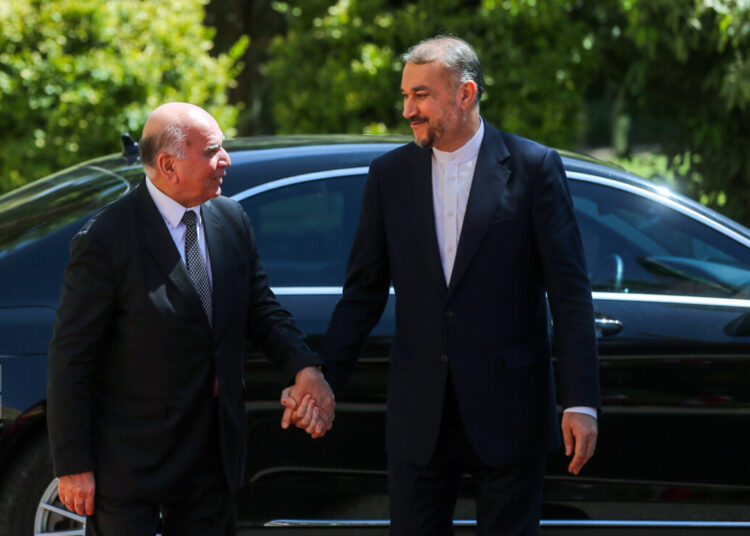The Iraqi Foreign Minister, Fuad Hossein, currently on a diplomatic visit to Iran, has engaged in discussions with his Iranian counterpart, Hossein Amirabdollahian. This visit was initiated at the behest of the Iranian authorities. In addition to his dialogue with Amirabdollahian, Hossein is also scheduled to consult with several other senior Iranian officials.
The visit is underpinned by a multitude of objectives, all aimed at nurturing and expanding Iran-Iraq relations across both bilateral and regional dimensions. However, a central theme of this visit is the dialogue between the two nations’ authorities concerning the implementation of the Iran-Iraq security agreement and the actions that have been undertaken in its wake. This dialogue incorporates perspectives from both Baghdad and the Kurdistan region of Iraq.
Iranian Foreign Minister, in a joint press conference subsequent to the meeting with his Iraqi counterpart in Tehran, said, “We had important discussions about the full implementation of the Iran-Iraq security agreement. Today, the Iraqi Foreign Minister presented good information regarding the withdrawal of terrorist groups from areas close to the borders of Iran and their transfer to the depth of Iraqi soil in the Kurdistan region”.
Amirabdollahian went to say, “We have received good news from the Foreign Minister of Iraq, Mr. Fuad Hossein. We remain hopeful that what we heard will be reflected on the ground. We place our trust in the words of the Iraqi Foreign Minister regarding the implementation of the security agreement.”
Iraqi Foreign Minister, in his turn, stressed Baghdad’s commitment to the bilateral security agreement with Tehran, saying that the aim is to disarm the Kurdish opposition groups in Iraqi Kurdistan region and that these groups will be relocated to camps under the supervision of the UN.
Nasser Kanaani, spokesperson for the Iranian Ministry of Foreign Affairs, recently commented on the Iran-Iraq agreement, stating, “The deadline for disarming terrorist and separatist forces in the Kurdistan Region is September 19, and this deadline will not be extended. This was clearly communicated by Iran and reiterated to the Iraqi authorities and the local government of the Kurdistan region”.
Nechirvan Barzani, president of the Iraqi Kurdistan region, affirmed in a meeting with the Iranian ambassador to Baghdad, “Iran is an important neighbor for us; the Kurdistan region adheres to the security agreement between Iran and Iraq. Iran should be sure that we will not allow the security of this country to be threatened from within this region.”
Over recent months, high-level consultations have been conducted between Tehran and Baghdad to implement the security agreement and address related challenges. One proposal was to construct a complex akin to the “Ashraf” camp for these groups in Anbar province and deep within the Kurdistan region.
On March 19, Ali Shamkhani, then secretary of Iran’s Supreme National Security Council, visited Iraq. During this visit, a ceremony attended by Iraqi Prime Minister Mohammad Shia al-Sudani saw the signing of the Iran-Iraq joint security cooperation agreement by Shamkhani and Qasim al-Araji, national security advisor to the Iraqi Prime Minister.
Last year saw several phases of border tension due to provocative actions by terrorists on Iran’s borders which were met with military responses from Iran. This led to consultations for this agreement. The aim of this agreement was to significantly reduce and manage unwanted security challenges between Tehran and Baghdad.
Investigations by Iran’s security entities reveal that some actions against Iran were orchestrated by Israeli agents within Iraq’s Kurdistan Region, in coordination with terrorist and separatist groups in the region. Tehran has issued several warnings that if Iraq does not address these groups’ continued activities on Iran’s borders, Iran reserves its right to defend its border security.
Historically, certain Iraqi Kurdish groups and Israel have maintained enduring ties. However, over the past two years, in accordance with Israel’s peripheral policy, this collaboration has broadened, particularly in the realms of security, intelligence, and operations. This has evolved into a threatening operation against Iran.
Historical evidence indicates that Israel has been instrumental in advocating for the disintegration of countries in the region, including Iraq and Syria. Recent regional reports also suggest that despite the establishment of relative security in Iraq and Syria, Israel has resumed its close, regular, and organized activity along the shared borders of these two countries. This activity aims to resurrect terrorist groups, potentially leading to destructive operations throughout Syria and Iraq.






